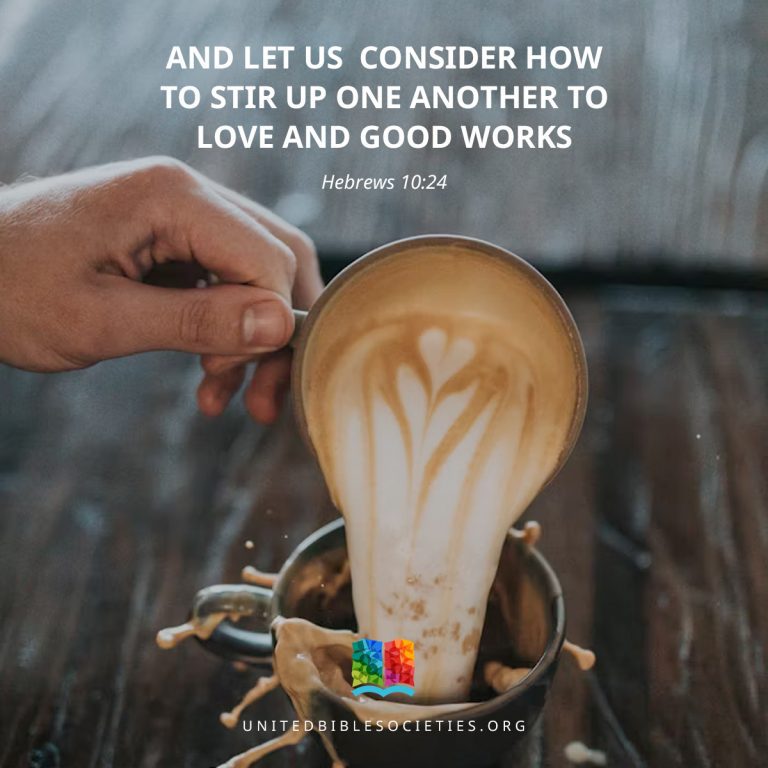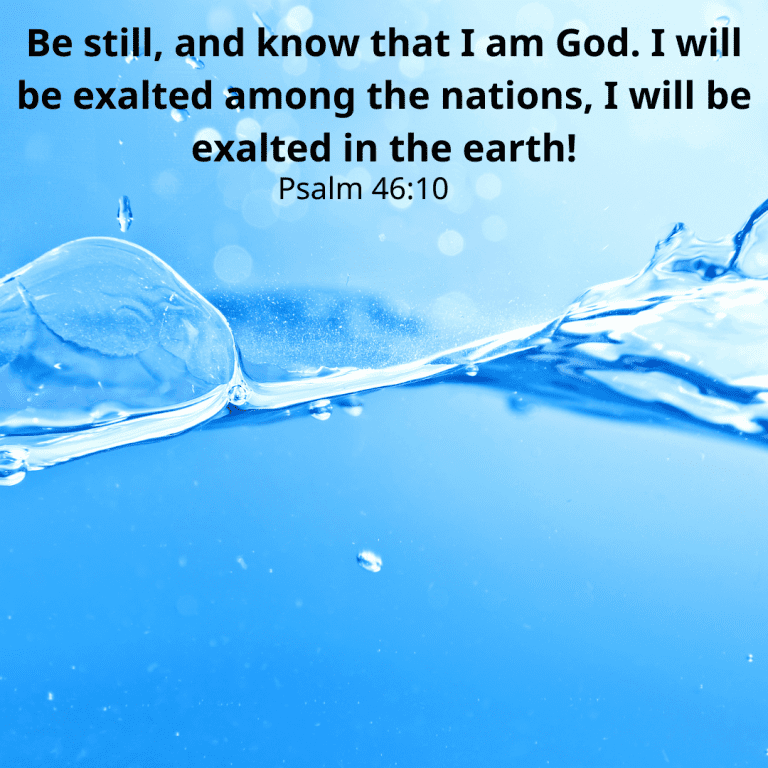1 The Jewish Law is not a full and faithful model of the real things; it is only a faint outline of the good things to come. The same sacrifices are offered forever, year after year. How can the Law, then, by means of these sacrifices make perfect the people who come to God? 2 If the people worshiping God had really been purified from their sins, they would not feel guilty of sin any more, and all sacrifices would stop. 3 As it is, however, the sacrifices serve year after year to remind people of their sins. 4 For the blood of bulls and goats can never take away sins.
5 For this reason, when Christ was about to come into the world, he said to God:
“You do not want sacrifices and offerings,
but you have prepared a body for me.
6 You are not pleased with animals burned whole on the altar
or with sacrifices to take away sins.
7 Then I said, ‘Here I am,
to do your will, O God,
just as it is written of me in the book of the Law.’”
8 First he said, “You neither want nor are you pleased with sacrifices and offerings or with animals burned on the altar and the sacrifices to take away sins.” He said this even though all these sacrifices are offered according to the Law. 9 Then he said, “Here I am, O God, to do your will.” So God does away with all the old sacrifices and puts the sacrifice of Christ in their place. 10 Because Jesus Christ did what God wanted him to do, we are all purified from sin by the offering that he made of his own body once and for all.
11 Every Jewish priest performs his services every day and offers the same sacrifices many times; but these sacrifices can never take away sins. 12 Christ, however, offered one sacrifice for sins, an offering that is effective forever, and then he sat down at the right side of God. 13 There he now waits until God puts his enemies as a footstool under his feet. 14 With one sacrifice, then, he has made perfect forever those who are purified from sin.
15 And the Holy Spirit also gives us his witness. First he says,
16 “This is the covenant that I will make with them
in the days to come, says the Lord:
I will put my laws in their hearts
and write them on their minds.”
17 And then he says, “I will not remember their sins and evil deeds any longer.” 18 So when these have been forgiven, an offering to take away sins is no longer needed.
Let Us Come Near to God




19 We have, then, my friends, complete freedom to go into the Most Holy Place by means of the death of Jesus. 20 He opened for us a new way, a living way, through the curtain—that is, through his own body. 21 We have a great priest in charge of the house of God. 22 So let us come near to God with a sincere heart and a sure faith, with hearts that have been purified from a guilty conscience and with bodies washed with clean water. 23 Let us hold on firmly to the hope we profess, because we can trust God to keep his promise. 24 Let us be concerned for one another, to help one another to show love and to do good. 25 Let us not give up the habit of meeting together, as some are doing. Instead, let us encourage one another all the more, since you see that the Day of the Lord is coming nearer.
26 For there is no longer any sacrifice that will take away sins if we purposely go on sinning after the truth has been made known to us. 27 Instead, all that is left is to wait in fear for the coming Judgment and the fierce fire which will destroy those who oppose God! 28 Anyone who disobeys the Law of Moses is put to death without any mercy when judged guilty from the evidence of two or more witnesses. 29 What, then, of those who despise the Son of God? who treat as a cheap thing the blood of God's covenant which purified them from sin? who insult the Spirit of grace? Just think how much worse is the punishment they will deserve! 30 For we know who said, “I will take revenge, I will repay”; and who also said, “The Lord will judge his people.” 31 It is a terrifying thing to fall into the hands of the living God!
32 Remember how it was with you in the past. In those days, after God's light had shone on you, you suffered many things, yet were not defeated by the struggle. 33 You were at times publicly insulted and mistreated, and at other times you were ready to join those who were being treated in this way. 34 You shared the sufferings of prisoners, and when all your belongings were seized, you endured your loss gladly, because you knew that you still possessed something much better, which would last forever. 35 Do not lose your courage, then, because it brings with it a great reward. 36 You need to be patient, in order to do the will of God and receive what he promises. 37 For, as the scripture says,
“Just a little while longer,
and he who is coming will come;
he will not delay.
38 My righteous people, however, will believe and live;
but if any of them turns back,
I will not be pleased with them.”
39 We are not people who turn back and are lost. Instead, we have faith and are saved.
aza 10
Kwruztu muŋw ṯiŋaṯa rogwɽɔ lu eḏorɔ karama kiṯemḏi karama la tatap keḏi muuza
1 na kaka ma gwu kuruu ṯiŋaḏa ṯigɽima lu domony ṯeḏi kwɔmne kwizaw kwinḏi eḏila, nuŋw ere orɔ dap mac kwɔmne ŋgwu, ŋwu ta nuŋw ere eḏi ŋuma tɔk mac karama gi, keṯir kekite yiḏleyu yiḏleyu, eḏi zi ṯimazi kworɔ dap kla leṯiduŋgwaḏa nana. 2 eŋguŋw zi ruzi minmin ta, eŋgir ere ala karama rii manya? eŋgi kla leṯi kwɔkwocelu zuɽi rugwor-na tuc, eŋgir ere elŋece rɔgwɽɔ reŋen mac eḏaruŋw, reni kinna riki. 3 lakin karama gi eŋgu keṯir kekite, eṯir gwu kikiḏayini ŋikyaŋi yiḏleyu yiḏleyu. 4 kaka iti eḏi gwu ŋin ŋeḏi nyiḏri-ŋa nyɔ nyi ŋuma ḏuṯ eḏi dimi ŋikyaŋi kiṯay.
5 ŋwu ṯaŋwu, ki lomur limɔ li Kwruztu enḏa ki ṯurmun-na, nuŋw aruŋw:
ati kwumɔnaŋni mac karama kere na haḏiya,
lakin a kwumenyi ketize aŋna;
6 na kwɔmne kweṯir ŋa dunnici kwir ŋirel, na karama keḏi ŋikya, kiti kimɔ ŋa əmi-na mac.
7 mindaŋ nenyeca ŋwu: nyi ŋgwu ta; nyi kwumila eḏizerrici ŋaŋwu ṯugwor ṯi ṯɔŋwa, Allah winyi,
kaka luḏinar gwu ŋeni nyi kiṯam-na.
8 muŋw aruŋw: ati kwumɔnaŋni mac karama kere, na haḏiya were ere əmi ŋaŋwu-na tɔk mac, na kwɔmne kweṯir ŋa dunnici kwir ŋirel, na karama keḏi ŋikya, kinderṯa keṯir kekite kuruu gi, 9 nuŋw kiɽezi ŋiɽaŋali, nuŋw eca ŋwu: izaṯi, nyi kwumila eḏizerrici ŋaŋwu ṯugwor ṯi ṯɔŋwa. nuŋw ṯa iri kiṯay ŋiɽaŋali ŋa ŋeḏi kerrenyŋw, mindaŋ eḏi miḏeḏa ŋiɽaŋali ŋiaŋ teter. 10 na ṯugwor ṯi ṯedi Allah a kwumer irlinelu ter karama gi kir aŋna weḏi Yecu Kwruztu, tamin tutuput dak.
11 na eṯi yiziiz tatap rilli ŋwamin tatap ki ŋɔḏɽor-na ŋeŋen yeṯi kekite karama ŋga kete kete ŋwamin rac ŋwamin rac, kiti keḏi ŋuma ḏuṯ eḏi zi dimeḏa ŋikyaŋi kiṯay. 12 lakin Kwruztu ta, muŋw kete karama keḏi ŋikya kutuput dak keṯeḏi fayḏa dɔk, nuŋw nanalu ki ṯii ṯeḏi mini ṯeḏi Allah, 13 mindaŋ əkizaŋw gwu ṯuwənu ṯuŋwun kizen eḏi gwu kete ŋwara la ŋwuŋwun. 14 kaka karama gi ṯa ŋga kutuput ṯuɽuk, nuŋw zi ṯimaci kworɔ dap tuc kla leṯirlinelu ter. 15 eṯinyji ŋi Ṯigɽim tirlinelu ter unḏizi ki ŋwu tɔk; kaka muŋw gwu aruŋw:
16 ṯikitaḏiza ṯinderṯa kḏu ṯenyi kete ŋunduŋali
ma ŋwamin ŋwa ila, ari gwu Kweleny ŋwu:
nyi kwukete kuruu kinyi ki rugwor-na reŋen,
mindaŋ enyji loce ŋaɽiny-na ŋeŋen tɔk.
17 nuŋw kiɽezi ŋiɽaŋali, ŋaruŋw:
nyi kwiti kwuṯiŋayini ŋikyaŋi ŋeŋen kwokwony ḏuṯ,
na ŋa ŋakir ŋi ŋiɽaŋali ŋinyi pir.
18 na ma ṯififrina ṯeḏi ŋikya nani, eṯi karama keḏi ŋikya ere nani kwokwony mac.
ṯifirlazala na ṯireca
19 ŋwu ṯaŋwu, lieŋgeri, a kweḏir ŋuma eḏi bonye eḏenḏi kezir wirlinelu ter wuṯemḏi rerec ŋin ŋi ŋeḏi Yecu, 20 ṯay ṯi ṯiaŋ ṯeḏi ŋimiiḏa-na ṯimɔŋw kiṯici nyuŋwuzi aŋna yi-na wuŋwun, wunde wir kaka kireṯ keḏi kheyma. 21 a kweḏir tɔk Kiziiza kiṯemḏelu kir kweleny kweḏi duənu kweḏi Allah. 22 ŋwu ṯaŋwu, er duŋgwaḏa nana ṯugwor ṯi ṯutuput ṯəmna ṯi tir minmin, rugwor ri reri reni riki rimɔrecine iininy yi-na eḏi zuɽi-na, na yaŋna yeri yimɔ iini nana ŋaw ŋi ŋizuɽu. 23 er miḏa ṯəkiza ṯeri kizen titir, ṯimerzi ruwecelu, liti lari lu tiŋgil tiŋgil mac, kaka enuŋw gwu kwirlalu ŋgwa kwumenyji kitaḏa. 24 na er ṯiŋayiniḏizina wuɽe-wuɽeny eḏi zi ukwazi eḏamɽaḏizina, na eḏizerri ŋizaw, 25 liti lidirna mac eḏi rayḏa duŋw kaka eṯir zi gwu erri lɔkwɔ, lakin lifirlaḏizala wuɽe-wuɽeny ma gwu eze lamin kla limadiḏi keṯɔk eḏila.
26 merzerri ŋiki rugwor ri reri, mer gwu afi ṯilŋiiḏina ṯeḏi ŋirlalu, a karama keḏi ŋikya ere nani kere kwokwony mac, 27 lakin er əkizi hukma kizen ŋiḏeny ŋi ŋupa, na igəŋi wufuḏu cicir, winḏi eḏi dunnazi ṯuwənu kiṯay ṯeḏi Allah. 28 ma kwere aki kuruu pir keḏi muuza, eṯir eɽenye, kwiti kweḏicer ŋimɽya-na mac, ma lizi nden ya ṯɔɽɔl kiɽmiḏi-na. 29 eta, ŋaŋa lari ḏa ki rɔgwɽɔ-na ralu? hukm winder wendu winḏi kwizi ŋgwa eḏafi, kwumɔ rutaḏa Toru lu teḏi Allah, kwumɔ ruzi ŋina luŋw ŋeḏi ṯikitaḏiza, ŋimɔŋw ŋi irlinelu ter, na kwumɔ kiici Tigɽima ŋiɽaŋali ṯir ŋimɽi? 30 kaka ilŋiicar gwu ŋgwa kwaruŋw: hukm winyi wiri, ŋenyji ṯa ərici kaka ṯa ŋa. na kwokwony: Kweleny kwiri kwezi hakwumi leni luŋwun. 31 ŋinderṯa ŋeḏi mi ŋiḏeny-na ŋupa ŋiminni eḏiida ki rii-na reḏi Allah wumiiḏu.
ṯukwaza eḏi ferle teter
32 na kiḏayinar ŋwaminu ŋweḏi kerrenyŋw, enḏi ŋa ki fori-na ṯayṯi, na kwurmɔṯani ki ṯurfa-na ṯupa. 33 nyamin nyere nyere ner ŋazi ɔllɔlɔ, ner ŋazi owɽi yey ŋwuduŋw-na pɔrpɔr, na ma liaŋgalu owɽini yey ta, eṯi li kannaḏi ṯurfa ṯeŋen. 34 na ŋazi ŋimɽi yaḏa ki lizi kla linani zijin, na nyimeḏir ŋazi gwu, na ta amina, kaka ilŋiicaŋa gwu eḏaruŋw, nyiŋa leḏi ŋurṯua ŋiṯemḏi, ŋeṯinani dɔk kilerena. 35 ṯaŋwu, eṯi ṯuza ŋuguli ŋalu mac, kaka eḏir gwu ujra wupa. 36 kaka ofḏanir gwu eḏi kwurmɔṯani mindaŋ mezerri ṯugwor ṯi ṯeḏi Allah, mindaŋ ma afi ŋgwa kwumɔŋw gi kitaḏa. 37 kaka luḏinar gwu, ŋaruŋw:
kwaḏan kwɔkwɔ ŋgwa kwinḏi eḏila ŋwila,
kwiti kwuɽindaŋnalu mac;
38 na ŋgwa kweni kwinyi, kweni kwofḏana ṯəmna ṯi, kwunderṯa kwumiiḏi,
lakin, muŋw aɽiḏa kwaḏan gi, eṯuŋw ere əmi rɔgwɽɔ-na rinyi ḏuṯ.
39 lakin ŋa tɔk, nyi tɔk, a kwende kwinḏir eḏorɔ kaka lizi limaɽiḏa kwaḏan gi mindaŋ mer kiraḏalu. a kwirir lete leḏi lizi-ŋa kla leḏi ṯəmna mindaŋ mer kileḏi rɔgwɽɔ reŋen.

